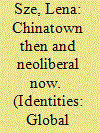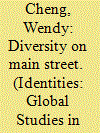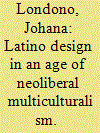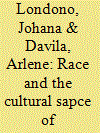|
|
|
Sort Order |
|
|
|
Items / Page
|
|
|
|
|
|
|
| Srl | Item |
| 1 |
ID:
101040


|
|
|
|
|
| Publication |
2010.
|
| Summary/Abstract |
This article explores the intersection of cultural tourism, gentrification, and urban development in the neoliberal period by examining the complex and ambivalent relationship between an "ethnic-specific" cultural institution and a rapidly gentrifying neighborhood. Through a case study of the Museum of Chinese in America's (MoCA) profile, history, and community involvement in Manhattan's Chinatown, this article suggests that small to midsize ethnic-specific museums relate to the social and spatial transformations inherent in gentrification through a mechanism called gentrification consciousness. This mechanism helps to explain how an institution whose history, mission, and politics might indicate a resistance to gentrification is confounded and constrained by the larger neoliberal landscape. Offering little in the way of substantive alternative funding and space, neoliberal urban development touts tourism and culture as key routes to economic development with gentrification as a "natural" and beneficial by-product of such development for both the surrounding neighborhood and for individual cultural institutions. An analysis of the unique relationship of smaller ethnic-specific organizations to gentrification processes complicates discussions about museums and gentrification as well as potentially identifying methods and measures of institutional success that do not rely so heavily on neoliberal logics and policy prescriptions.
|
|
|
|
|
|
|
|
|
|
|
|
|
|
|
|
| 2 |
ID:
101038


|
|
|
|
|
| Publication |
2010.
|
| Summary/Abstract |
The emergence in the United States of an increasing number of spaces across the socioeconomic spectrum with majority nonwhite populations merits close attention because of these spaces' potential in reconfiguring historical and contemporary claims to place. In an era in which the neoliberalization of urban development has spurred local governments toward more active involvement in defining relationships between race, ethnicity, consumption, and space, "majority-minority" suburbs are particularly important sites of study. In the late 2000s, two branding campaigns in majority-Asian American and Latina/o municipalities in Los Angeles's San Gabriel Valley-a densely populated region popularly known as a "suburban Chinatown"-put forth specific discourses of race, ethnicity, and culture in attempts to actualize specific visions and claims to place, identity, and history. In doing so, these campaigns illuminated and reinforced larger racial, geographic, and ideological divides. "Diversity" on Main Street embraced pluralist multicultural discourses of the nation, while the "Golden Mile" proposal sought to showcase the transformation of a central thoroughfare by ethnic Chinese capital and immigration. A close examination and comparison of these two campaigns shows how struggles over race, geography, and history are intertwined in the contemporary identities of places and integral to the shaping of civic landscapes.
|
|
|
|
|
|
|
|
|
|
|
|
|
|
|
|
| 3 |
ID:
101039


|
|
|
|
|
| Publication |
2010.
|
| Summary/Abstract |
This article considers an emerging shift in Latino cultural politics of design representation and urbanism. To illustrate this shift, I include interviews with designers whose imaginative and geographic locations across the Americas have fostered a global attitude that challenges previous Latino designs that follow nationalist cultural politics of differentiation and are shaped by neoliberal multicultural imperatives. This article serves as an analytical study for scholars interested in understanding the ways in which cultural difference is included in a creative industry that has a large role to play in the configuration, evaluation, and theorization of poor, urban, and ethnic spaces. In particular, this article stimulates a debate about the different modes of incorporating Latino culture in design and generates future discussion on how to achieve more inclusive urban representations.
|
|
|
|
|
|
|
|
|
|
|
|
|
|
|
|
| 4 |
ID:
101042


|
|
|
|
|
| Publication |
2010.
|
| Summary/Abstract |
At the height of the United States wars in Southeast Asia in the 1970s, while political violence wrecked the provinces, Bangkok became one of the most visible sites of violence in Thailand against leftist social movements. Drawing from an ethnography of commemoration and the military archive, I suggest that after thirty years of silence, current commemorations speak to how emotional engagements are maneuvered in the public arena into a politics of forgetting. At the same time, relatives of those killed by state violence and activists enact mourning practices to insist on loss and to challenge the state-sponsored celebrations of fallen heroes. Ultimately, Thai pasts are worked through these commemorations as "spectacular-time." As spectacle, the commemorations reenact the marches of the student movement as part of national history, to witness recreated scenes of violence, to relive particular landmarks as infused with meaning, and to identify with the alterity of 1970s leftist radicalism or the centrality of state manufactured democracy in Thailand.
|
|
|
|
|
|
|
|
|
|
|
|
|
|
|
|
| 5 |
ID:
101037


|
|
|
| 6 |
ID:
101041


|
|
|
|
|
| Publication |
2010.
|
| Summary/Abstract |
This article examines the feedback loop between governmental technologies of enumeration and surveillance and Hindu nationalist common sense that creates and sustains what I call "demographic anxiety" about Bangladeshi immigrants and Indian Muslims in the north Indian city of Jaipur. A series of bombings in 2008, rapidly and erroneously attributed to Bangladeshi infiltrators, brought to light the role of these forms of knowledge in struggles over city space and possible urban futures in Jaipur, as well as an incoherent but widespread construction of the demographically aggressive Muslim. I argue that "Bangladeshi" has thus become a mobile signifier that catches up disparate ways of "knowing" local populations. Drawing on personal and research experiences in Jaipur City and newspaper and other media accounts of the bombings, I track the mobilization of this signifier and its material consequences, particularly as they pertain to the fate of Jaipur's "Bangladeshi Basti," which became the site of intense police scrutiny in the aftermath of the bombings. I pay special attention to the ways in which the limits of governmental practices of legibility, such as identity documentation, produce both the will to statistical knowledge and a widespread reliance on common sense that reinforce one another.
|
|
|
|
|
|
|
|
|
|
|
|
|
|
|
|
|
|
|
|
|